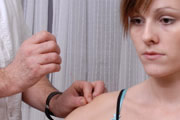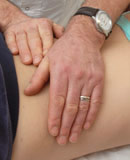Who and Why?
Until relatively recently the practice of acupuncture in this country was considered to be a form of ‘alternative medicine’ and subsequently categorized along with a range of unrelated disciplines that bore no relation to one another nor shared in it rich tradition. This banding was perhaps caused by the apprehension and even skepticism that arises when a seemingly alien practice is introduced into an established, possibly conventional and conservative culture. At best, acupuncture was classed as a form of ‘complementary medicine’; the inference therefore being, that acupuncture was in place to complement the western allopathic system. Sadly these conditions seemed to limit the exposure of acupuncture to a narrow section of the community and underestimated its potential to make significant contribution to national health and wellbeing.

Today acupuncture is almost considered mainstream. The profound results experienced by the general public can no longer be disregarded as mere anecdotal evidence and some in the medical and scientific communities have now begun to pay attention to the growing body of evidence that has accumulated, for more information please visit the page Links and Research. In addition the acupuncture profession has developed in such a way that the public can now be assured that competent and safe practitioners, bound by codes of practice and ethics, will treat them accordingly. Thus acupuncture is now utilized by an ever-increasing cross section of the community for a range of both physical and mental-emotional conditions.

Most people attending my clinic do so by way of 'word of mouth'; the clinic has been recommended by friends or families who have themselves experienced success with acupuncture. A significant number have learnt about the effectiveness of acupuncture through the media or otherwise, and have therefore sought referrals from friends, doctors or other health care practitioners. Many people have sought treatment at my clinic because they have not received satisfactory attention and or results from conventional medicine or their doctors. Or conversely, because they are experiencing unwanted side effects from the medications they have been given, in spite of the fact that they maintain good and positive relationships with their doctors. Whilst they are seeking a gentler and more holistic route, they are nevertheless expecting a successful amelioration of their conditions, illnesses, pain and suffering.
What conditions can acupuncture treat?
The table below lists the most commonly encountered patterns, conditions or diseases that are treated at the Iffley Acupuncture Clinic. Prospective patients should remember that the conditions listed below are not definitive and they should not therefore be deterred from seeking treatment should they find that their given problem does not appear on the list. In turn they need also be assured that when and if favourable results are not achieved, they will be advised accordingly. It should also be born in mind that whilst acupuncture achieves significant results in treating given or defined conditions, it does so by treating the person.
| Mental-Emotional Disharmony | Anxiety, Depression (including sadness and grief), Post-natal depression, Insomnia, Stress and stress related disorders |
| Musculo-skeletal | Lower back and spinal pain, Sciatica, Sports Injuries, Rheumatic aches and pains, Osteo and Rheumatoid Arthritis, Sequelae to trauma, e.g. Road traffic accidents, Repetitive strain injury, Carpal tunnel syndrome, Frozen Shoulder - tendonitis |
| Skin disorders and Cosmetic | Acne, Eczema, Psoriasis, Dryness of skin, Facial rejuvenation |
| Circulatory | Hypertension (high blood pressure), Palpitations: irregular heart beat and arrhythmias |
| Respiratory | Common cold, Influenza, Bronchitis, Cough (acute and chronic), Sinusitis and Rhinitis, Breathlessness, Asthma |
| Immune deficiency and fatigue | Tiredness and Fatigue, Chronic Fatigue including ME, CFIDS, Susceptibility to frequent infectious illnesses |
| Obstetric | Infertility, Threatened miscarriage and recurrent/ habitual miscarriage, Morning sickness, Induction of labour, Breech presentation and Malposition of foetus (turning of baby in utero), Pain relief during labour, Difficult labour, Post-natal depression, Post-natal problems with urination and bowel movements, Breast milk insufficiency and mastitis |
| Gynaecological | Absence of periods, Painful periods or, Irregular periods, Delayed or early periods, Heavy periods, Scanty periods, Mid-cycle bleeding, Premenstrual tension/ syndrome, including breast distension, Benign breast lumps, Endometriosis, Excessive vaginal discharge, Vaginal Thrush, Candida and vaginal itching, Pelvic inflammatory disease, Menopausal syndrome |
| Neurological | Headache, Migraine, Eye pain, Trigeminal neuralgia, Intercostal neuralgia, Neuralgia , Facial paralysis (Bells palsy) |
| Pain | Abdominal, Epigastric (beneath ribs), Hypochonria (flank and rib pain), Hypogastric (below the abdomen), Chest pain, Face, Head, Limbs and body pain |
| Gastro-intestinal | Constipation (acute and chronic), Diarrhoea (acute and chronic), Irritable Bowel Syndrome, Bloating and Distension, Flatulence, Excessive appetite, Loss of appetite, Obesity and weight gain, Weight loss and anorexia |
| Uro-genital | Painful urination, Cystitis (acute and chronic), Incontinence and stress incontinence, Dribbling, Hesitancy, Candida or thrush and impotence |
| Addictions | Cessation of smoking, Appetite control |
Nevertheless for the reader to fully appreciate the value and extent that treatment with acupuncture and Traditional Chinese Medicine can offer, I recommend that you download the PDF document for this section, Who and Why?. Within which you will find a more comprehensive discussion, not only in regard to specified conditions, but also in relation to the influence of this system on men, women and children. It includes also an evaluation of the treatment of mental-emotional patterns.

